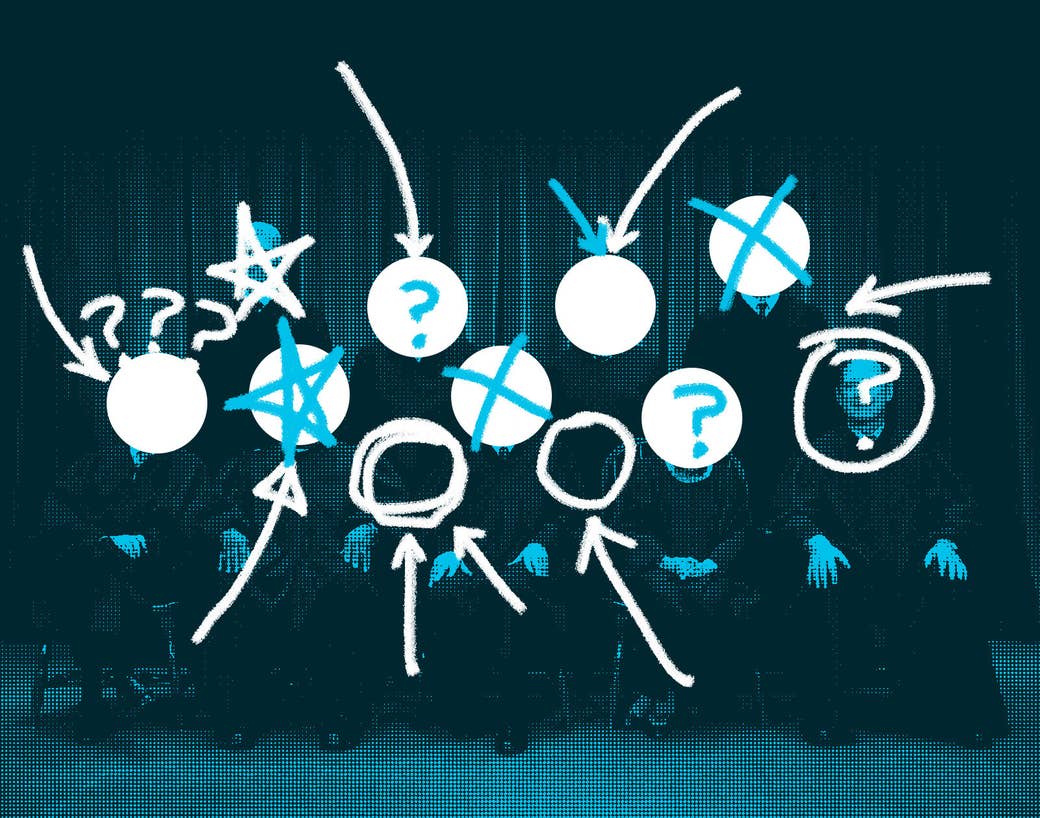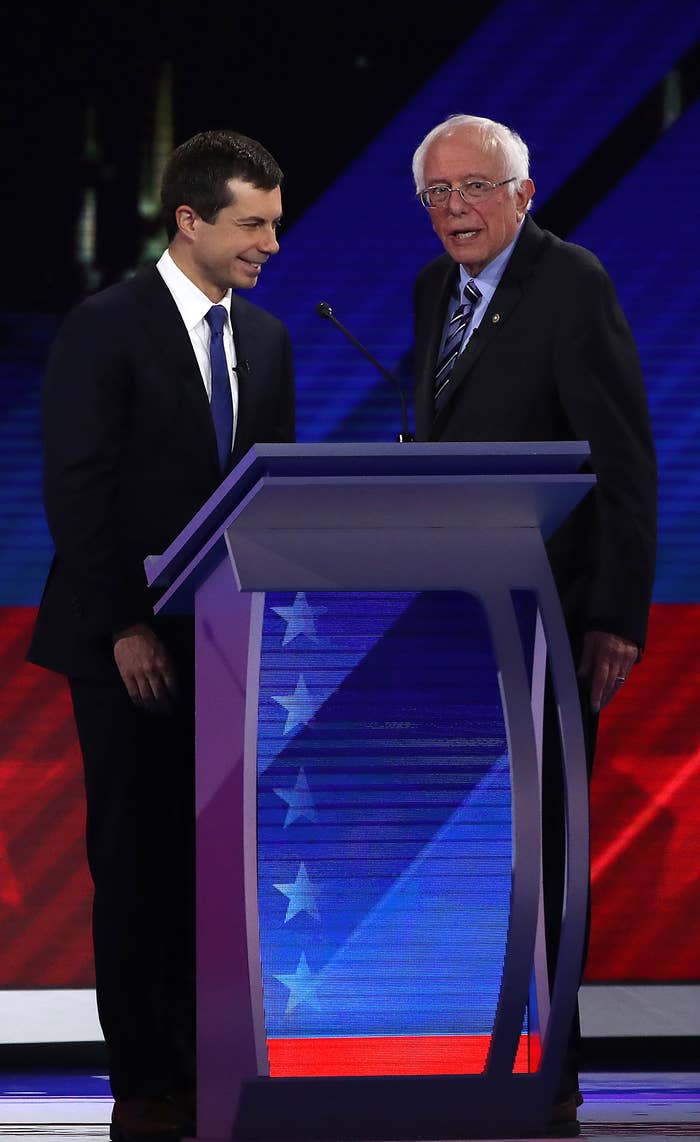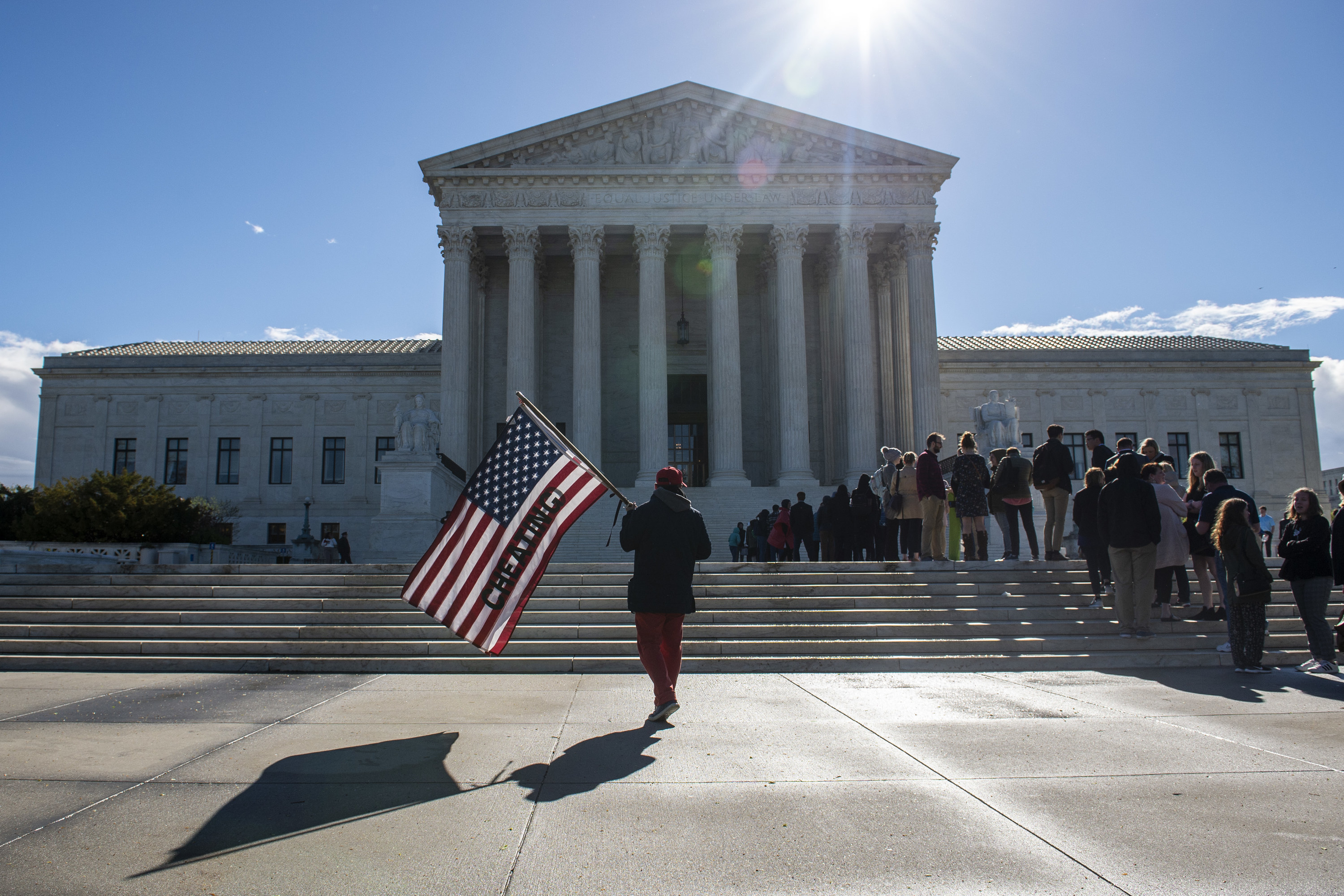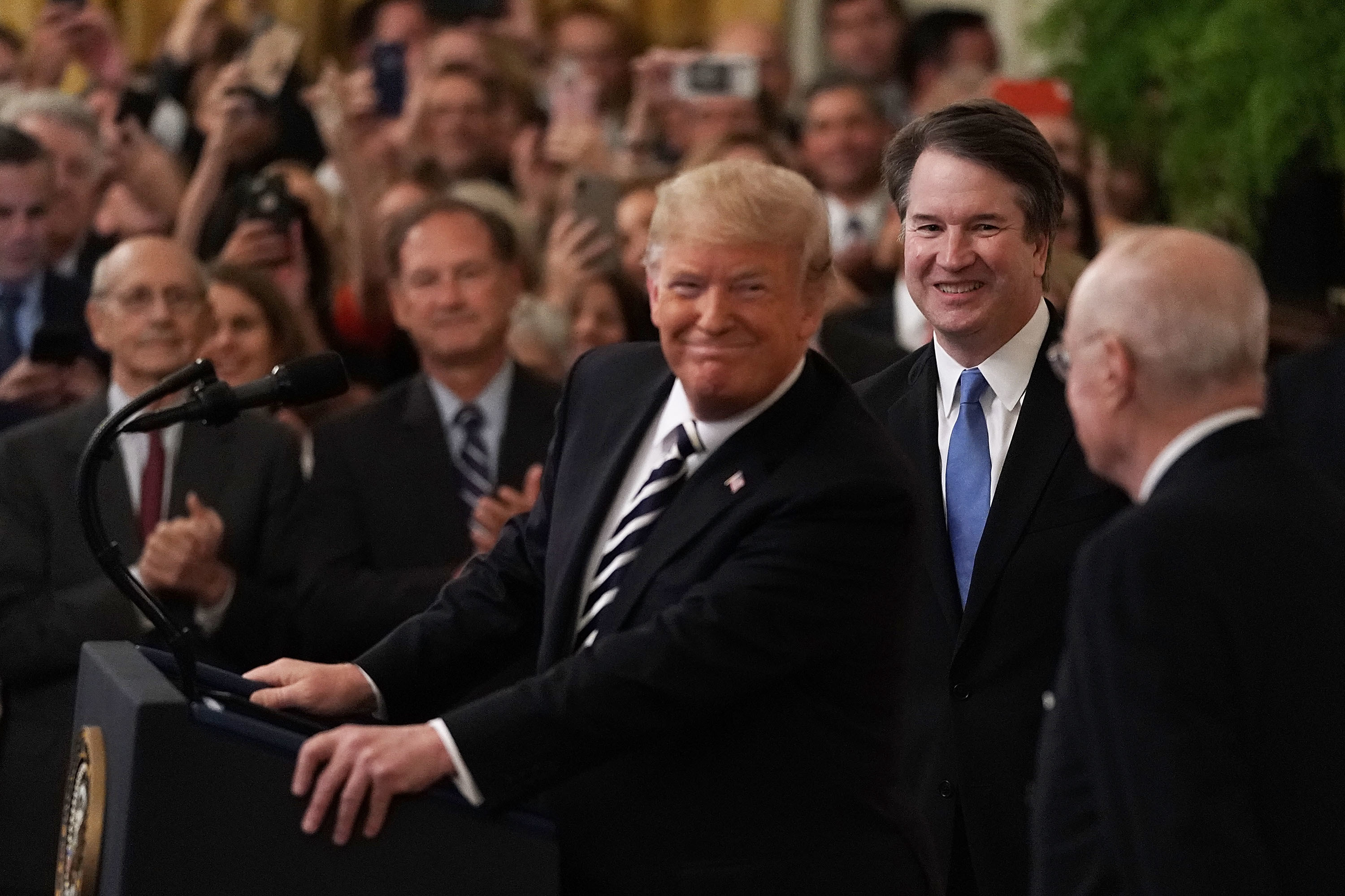
WASHINGTON — Over nearly three hours of debate among 10 Democratic presidential frontrunners, there was just one mention of the US Supreme Court Thursday night — a reference to a 1973 decision about school segregation.
The lack of attention to the courts in the Democratic primary is in stark contrast to the right’s embrace of the issue. President Donald Trump frequently touts his success dramatically reshaping the federal courts — he’s already filled two US Supreme Court seats, and the US Senate just this week confirmed the 150th judge nominated since he took office. His reelection campaign is even hawking T-shirts with the message “SUPREME COURT CHAMPS,” featuring silhouettes of Trump and Senate Majority Leader Mitch McConnell.
But so far, Democrats running to unseat Trump have barely made an issue of the courts at all. None of the top-polling candidates have made the future of the courts a central part of their platform, and some don’t even mention the issue on their websites. It’s barely come up in the first three primary debates.
Reaction to Thursday night’s debate from legal advocacy and court watchdog groups pushing to get the candidates to say something, anything, about the future of the Supreme Court and the rest of the federal judiciary was swift, and disappointed.
Gabe Roth, executive director of Fix the Court, sent a one-word email to BuzzFeed News as soon as the debate ended: “Welp.” Aaron Belkin, director of Take Back the Court, wrote that “the candidates don't seem to get that their bold new policies won't see the light of day because the Supreme Court will strike most of them down.”
Heading into the thick of the primary season, liberal legal advocacy groups are still optimistic, though. They see an opportunity to build on Democrats’ anger over Justice Brett Kavanaugh’s nomination last year and the Republican judicial confirmation juggernaut, hoping to finally make the courts an issue the left cares and talks about as much as the right does.
But they don't agree on how to do it, and they’re pitching competing visions and conflicting messages to campaigns — even as they acknowledge that it's been a challenge to capture the attention of candidates and voters at all.
In interviews, advocates on the legal left also acknowledged they are up against decades of consistent messaging from the right and are outmatched financially by conservative groups focused on the courts, such as the Judicial Crisis Network, which routinely touts six- and seven-figure ad campaigns.
“We are David fighting Goliath,” Belkin said.
Belkin’s group, Take Back the Court, has pushed heavily in favor of a plan to add seats to the Supreme Court, a tactic known as court-packing. Court-packing falls on the more radical end of the spectrum. Proponents like Belkin say it’s necessary to diminish the power of the court’s conservative majority. They argue that anything short of that won’t get the base engaged and won’t shield liberal policies from legal challenges even if a Democrat wins the White House in 2020.

“No candidate can be taken seriously if they don’t have a plan to protect their agenda from the courts,” Belkin said. “I continue to think it is frankly irresponsible to talk about judicial reform alternatives that look good on paper but have no chance of making a difference.”
The nonpartisan court watchdog group Fix the Court and other advocates are pitching what they see as less extreme ideas to reform the Supreme Court, such as term limits and stronger ethics rules for the justices. And still others don’t think the focus should be on structural changes at all — they want the conversation focused on the types of judicial nominees candidates would choose if elected. But even then, groups are divided about whether candidates should copy Trump’s strategy in 2016 of releasing a list of potential Supreme Court nominees.
Despite their disagreement about what the message should be, liberal advocates insisted in interviews with BuzzFeed News that they believe they have a chance to make the future of the courts a rallying issue in 2020.
“The problem on the left is there haven’t been enough ideas. There hasn’t been enough energy,” said Jeremy Paris of the Raben Group, who used to work on judicial nominations for Senate Democrats (Paris has previously done work for Take Back the Court but wasn’t speaking on the group’s behalf). “I’m not trying to be Pollyannaish — these fights among friends can be some of the messiest, but I don’t really think it’s a fight. I think it’s kind of a churning of ideas and energy, and I’m hoping it grows.”
Any discussion by Democrats about the courts is better than nothing, said Caroline Fredrickson, outgoing president of the American Constitution Society, a liberal lawyers group.
“It’s important for the nominees to articulate what is their vision for the third branch of government. It’s such a critical part of our constitutional framework, and Democrats haven’t been pressed in the past,” said Fredrickson (who was speaking personally and not on behalf of ACS). “It’s been a decades-long understanding on the right that the courts are essential to achieving success on their vision for our government. … They’ve never taken their eye off the ball.”
“We’re coming from so far behind.”
When it comes to Democrats talking about the courts, “I’m more agnostic about what the specific content is ... because we’re coming from so far behind,” she said.
Republicans have long embraced the courts as a core voting issue. In 2016, Trump wooed wary conservatives with a promise to prioritize nominating young, conservative judges for lifetime seats in the federal courts. It worked. But even after Republicans blocked Obama’s Supreme Court nominee in 2016, Judge Merrick Garland, the future of the Supreme Court and the rest of the federal bench never became a similar priority for Hillary Clinton’s campaign.
Conservative messaging around the courts often focuses on overturning or chipping away at Roe v. Wade, protecting gun rights under the Second Amendment, and limiting the power of the federal government to regulate business. Roe is a major issue for Democrats too, but it’s harder to pin down an easily digestible message from there — there are nuances as far as what the courts can do to support the issues liberals care about, from the environment and LGBTQ rights to voting access and protections for workers and consumers.
Conservatives, meanwhile, don’t seem worried about louder voices on the left when it comes to the courts. Mike Davis, president of the Article III Project, a group founded in May to support Trump’s judicial nominations, told BuzzFeed News that the more Democrats talk about restructuring the Supreme Court and nominating judges, “they are going to enrage the Republican base, who will show up in droves.”
“The Article III Project wants to pay for the left’s digital ads when they get involved in the judicial fight. Because anytime they’re talking about judicial philosophy and President Trump’s judicial nominees, the president and Republicans are always on the winning side,” Davis said.

Packing the Court
Court-packing is most often associated with President Franklin D. Roosevelt, who unsuccessfully tried to add more seats to the Supreme Court after winning reelection in 1936. The court had been knocking down his New Deal legislation, and Roosevelt wanted a fast way to dilute the power of those justices.
In October 2018, a group called Pack the Courts launched with the same idea. In June 2019, it rebranded as Take Back the Court. Belkin told BuzzFeed News that he still preferred the original name, but was overruled by “literally everybody,” given lingering negative public perception around the term “court-packing.”
The group hasn’t shied away from its founding principle, though, which is that the only way for Democrats to undo the damage of the Trump administration is to take control of the White House and Senate and pass a law adding more seats to the Supreme Court.
“Even if Democrats manage to squeak out victories and manage to squeak a couple of laws through Congress, Kavanaugh and his colleagues will rip them up,” Belkin said. “There's only one chance to get the democracy back.”
Belkin’s group isn’t alone. Demand Justice, a liberal group focused on courts created in May 2018, is also on board. Last month, March for Our Lives, the gun control advocacy organization created by survivors of the 2018 Parkland mass shooting, released a “Peace Plan” that included reforming the Supreme Court and linked to articles about court-packing.
“Just treading water by replacing judges appointed by Obama and [former president Bill] Clinton is not going to do anything to undo the egregious situation that took place with the Merrick Garland appointment,” said Brian Fallon, executive director of Demand Justice.
Take Back the Court scored its first big win in February, when it successfully planted a question about court-packing at a Philadelphia campaign event for Democratic presidential candidate Pete Buttigieg. Buttigieg suggested he was open to the idea, generating a round of media attention and debate among legal scholars.
“We don’t want to go too far ... and end up with a court that has 37 justices.”
In June, the New York Times asked Democrats running for president if they were open to adding seats to the Supreme Court. Some said they were — including Buttigieg, Sens. Kamala Harris, Amy Klobuchar, and Elizabeth Warren, and Andrew Yang — and some expressed doubts — including Sens. Cory Booker and Bernie Sanders, Julián Castro, and former representative Beto O’Rourke.
Former vice president Joe Biden declined to participate in the Times’ feature, but has expressed opposition to court-packing.
“If we pack the court, it’s going to come back and eat us alive,” Biden said at an event in July, captured in a video that Fallon tweeted.
Biden is the only candidate whose campaign website does not mention a plan for the Supreme Court or federal courts as part of his policy platforms, according to a review by BuzzFeed News. Biden campaign national press secretary Jamal Brown gave a statement to BuzzFeed News highlighting Biden's role in opposing Judge Robert Bork's failed nomination to the Supreme Court in 1987 because of concerns about his record on abortion and birth control access, and his support for Democratic nominees and opposition to Republican ones since then. Biden "has led and overseen impactful efforts that have shaped and enhanced the overall integrity of our nation's judicial system," Brown said.
Court-packing has plenty of critics. Gabe Roth of Fix the Court told BuzzFeed News that he thinks getting behind court-packing is a mistake. If Democrats win in 2020 and succeed in adding seats, Roth said he feared both parties would keep trying to outdo each other.
“There’s just this concern that I have that we have a unique opportunity and we don’t want to miss it,” Roth said. “We don’t want to go too far in the other direction and end up with a court that has 37 justices.”

Term Limits
Fix the Court is pitching a plan for term limits on Supreme Court justices. A new justice would be added to the court every other year, and future justices would serve a maximum of 18 years. The current justices could serve the remainder of their lifetime tenure; Roth notes the irony that there would likely be more than nine justices for several years until only new, term-limited justices are in rotation.
Belkin, meanwhile, called term limits an example of court reforms “that look good on paper but have zero chance of working in practice.”
“During that huge gap, [Chief Justice John] Roberts and Justice Kavanaugh would shred the law,” he said.
“Reelecting Donald Trump probably means that the current 5–4 majority will grow to 6–3 or even 7–2.”
Demand Justice has endorsed term limits along with court-packing. They’ve also proposed adopting a formal code of ethics on the Supreme Court; currently, the justices are covered by federal conflict of interest laws, but they aren’t bound by the same set of ethics rules and disciplinary review process as lower court judges. Fix the Court has also promoted stronger ethics rules for the court.
“I don’t think that in order for the courts to be salient on the left in time for the 2020 election that all of the groups need to align behind a particular vision of structural reform,” Fallon said. “To me, what would count as success is if Democrats are properly educated about the high stakes of the court. If they realize for instance that reelecting Donald Trump probably means that the current 5–4 majority will grow to 6–3 or even 7–2, and we won’t be able to hope for John Roberts to save us.”
The Washington Post asked Democratic candidates about term limits — O’Rourke and Yang said they supported them; Booker, Buttigieg, Castro, Harris, and Warren said they were open to the idea; and Klobuchar was against it. Biden and Sanders didn’t give clear answers to the Post, but Biden was quoted in July saying that he was against term limits for the Supreme Court. Sanders told the New York Times he was open to a version of term limits that involved rotating judges onto the appeals courts.
To Name or Not to Name
Some groups are staying out of the debate over reforming the Supreme Court altogether. Marge Baker, executive vice president of People for the American Way, said it isn’t taking a position. Baker said the group believes the most effective way to engage voters is to highlight why the courts matter on issues that liberals care about and what kinds of nominees should be on the bench.
“I understand why those reforms are being raised because of the importance of the issue and in terms of having the public engaged. I understand why those proposals are out there. But we’re really focused on what kinds of judges and justices they want to nominate … and why that’s important,” Baker said. “Those underlying values can sometimes get lost in which particular reform you’re advocating for.”
Baker said her organization is in the early stages of trying to organize a courts-focused candidate forum, she said, but hasn’t contacted the campaigns to gauge interest yet.
Dan Goldberg, legal director of Alliance for Justice, said it also isn’t weighing in on the structural reforms debate. Earlier this year, the group launched a project called “Building the Bench” aimed at identifying potential candidates for the Supreme Court and lower courts — Goldberg said they want a future Democratic president prepared to consider nominees from day one.
Alliance for Justice doesn’t plan on releasing its list, earning criticism from the conservative Judicial Crisis Network, which pointed to Trump’s decision to publish his list of Supreme Court shortlisters. Goldberg said that criticism was “very rich” given that Trump’s campaign and the White House haven’t released names they’ve considered for the lower courts. As for the Supreme Court, Goldberg said the organization’s project wasn’t intended as a take-it-or-leave-it proposition for a future Democratic president.
“Our intent is to be a resource for senators and for a Democratic White House in making sure, as they’re considering who to nominate, they have the broadest pool,” Goldberg said.
Baker said she didn’t think it was necessary for the Democratic presidential candidates to follow Trump and release a list of Supreme Court candidates. Fredrickson said the idea made her “a bit uncomfortable,” especially in advance of any official vetting process.
“It’s not about a particular name of a potential nominee, it’s about what that nominee would do. It’s about … what you want to see in that judicial nominee,” Baker said.
Fallon disagrees. Part of Demand Justice’s 2020 strategy involves messaging around nominees — they want candidates to commit to not nominating former corporate lawyers — and he wants candidates to release names. He said Demand Justice is compiling its own dream list of Supreme Court contenders and will make it public. Concern about the right launching attacks on possible Democratic nominees was outweighed by the benefit of making the issue tangible for voters, he said.
“Progressives cannot go around complaining about the fact that our voters don’t seem to treat the courts as important and then try to shut down conversation about the courts,” he said. “Let’s name names and make it real for people about the type of person that could potentially succeed [Justice Ruth Bader Ginsburg] if we actually taken back the White House in 2020.”
Mike Davis of the Article III Project says he wants “to send Brian Fallon and Chris Kang at Demand Justice a case of beer every week that they talk about judges so they can cry in their beers after Republicans beat the Democrats in the next election because of judges.”

Rallying the Base
Trump, meanwhile, frequently highlights his success confirming Supreme Court justices and lower court judges in his reelection stump speeches. At his 2020 kickoff event in June, he lambasted Democrats for their opposition to Kavanaugh and pledged to continue to break records in nominating judges and filling a large proportion of federal court vacancies.
"By the time we’re finished with the rest, we will have record percentages. Our percentage will be a record except for one person, and one person has a higher percentage than your favorite president, Donald Trump. Do you know who that president is?" Trump said at the time. "His name is George Washington."
A source close to Trump’s reelection efforts who wasn’t authorized to discuss internal conversations told BuzzFeed News that the campaign sees the courts as “a pretty key part of their messaging, and their coalitions building.” The source said the campaign hadn’t talked yet about whether to release a refreshed version of Trump’s Supreme Court list going into 2020.
The campaign didn’t respond when asked about the status of the president’s nominee list, but spokesperson Erin Perrine said in a statement that they’ll “talk about all of President Trump’s successes and certainly in regards to the high-caliber of judges confirmed during the Trump administration.”
Courts-focused groups on the left and good government groups like Fix the Court have been reaching out to the Democratic campaigns to get their messages across; as a nonpartisan group, Fix the Court also sent its term limits plan to the Trump campaign, Roth said. They’re also urging state-level organizers to push the issue on the campaign trail. Earlier this week, Demand Justice sponsored an event in New Hampshire about the courts and 2020 that included former Vermont governor and presidential candidate Howard Dean.
Jeremy Paris said he didn’t think the issue had picked up steam yet at the grassroots level, but he hopes that will change.
“I don’t know that we really are acting like it’s a crisis,” he said. “Every ambitious agenda item that a presidential candidate has is ultimately going to depend to some degree, if not an entire degree, on who is sitting on the federal bench. They need to have a strategy around judges.” ●

